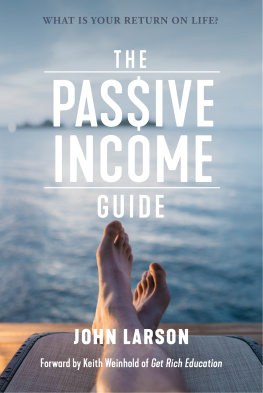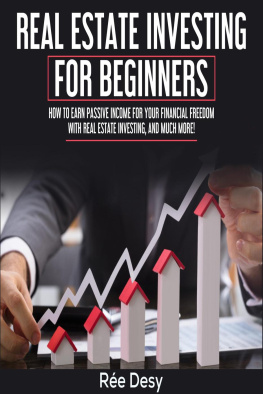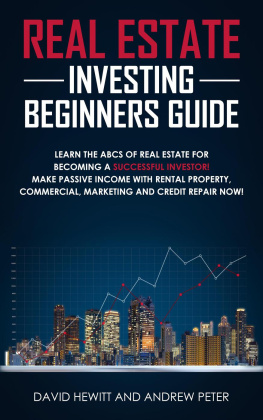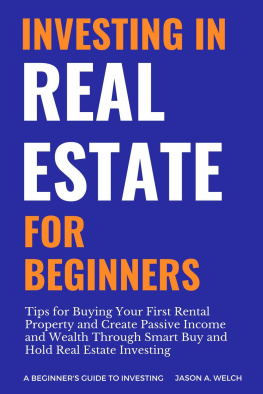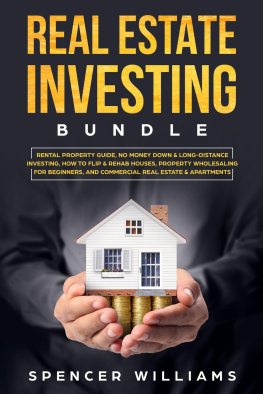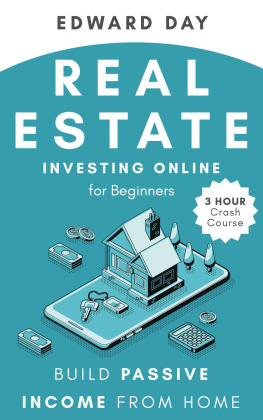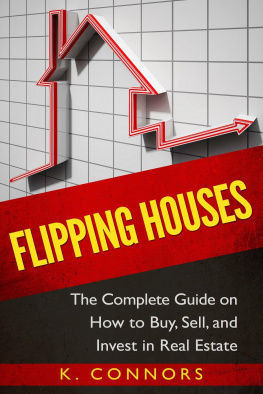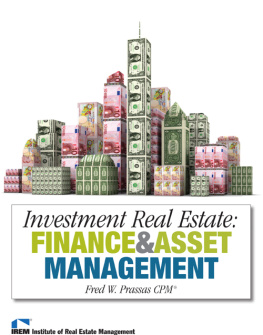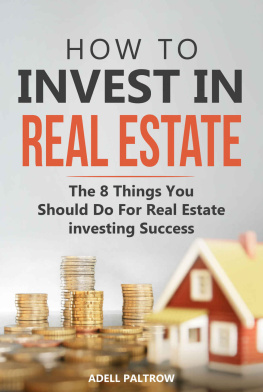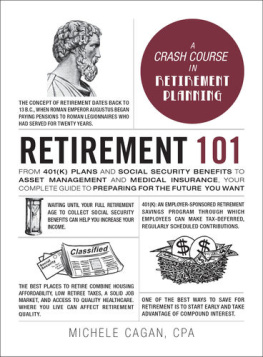This book is a guide to the foundational financial concepts upon which all real estate projects are based and explains the language of real estate from an insiders perspective. It provides a road map of what to watch for and how to win at the game of passive real estate investing.
We applaud Adams thorough effort to educate investors on this new exciting and important opportunity for investing in real estate online. We share the point of view that an educated and informed investor is more successful over the long haul. Jump in, and get started building your own personal real estate portfolio!
Adam provides a blueprint for success when investing in crowdfunded real estate deals. If you want to learn from one of the most successful real estate professionals in the industry, look no further than this must-have book.
Real Estate Crowdfunding
An Insiders Guide to Investing Online
Adam Gower

First published 2021
by Routledge
2 Park Square, Milton Park, Abingdon, Oxon OX14 4RN
and by Routledge
52 Vanderbilt Avenue, New York, NY 10017
Routledge is an imprint of the Taylor & Francis Group, an informa business
2021 Adam Gower
All rights reserved. No part of this book may be reprinted or reproduced or utilised in any form or by any electronic, mechanical, or other means, now known or hereafter invented, including photocopying and recording, or in any information storage or retrieval system, without permission in writing from the publishers.
Trademark notice: Product or corporate names may be trademarks or registered trademarks, and are used only for identification and explanation without intent to infringe.
British Library Cataloguing-in-Publication Data
A catalogue record for this book is available from the British Library
Library of Congress Cataloging-in-Publication Data
Names: Gower, Adam, author.
Title: Real estate crowdfunding: an insiders guide to investing online/Adam Gower.
Description: First edition. | Boca Raton: CRC Press, 2020. | Includes bibliographical references and index.
Identifiers: LCCN 2020028981 (print) | LCCN 2020028982 (ebook) | ISBN 9780367428044 (hardback) | ISBN 9780367428068 (paperback) | ISBN 9780367855239 (ebook)
Subjects: LCSH: Real estate investment. | Crowdsourcing.
Classification: LCC HD1382.5 .G68 2020 (print) | LCC HD1382.5 (ebook) | DDC 332.63/24dc23
LC record available at https://lccn.loc.gov/2020028981
LC ebook record available at https://lccn.loc.gov/2020028982
ISBN: 978-0-367-42804-4 (hbk)
ISBN: 978-0-367-42806-8 (pbk)
ISBN: 978-0-367-85523-9 (ebk)
Typeset in Bembo
by Newgen Publishing UK
Contents
Id like to start off by acknowledging that you are (probably) not here because you have a deep and abiding curiosity about the exciting and glamorous world of commercial real estate and real estate syndications. Youre here because you are searching for ways to secure your financial future and to diversify your retirement savings, and youre looking for unbiased, verifiable, factually accurate information about how crowdfunded real estate syndications can help you grow and preserve your wealth.
Im going to kick off our journey by explaining why you really shouldnt be intimidated by the scope of learning about crowdfunding, and real estate investment as a whole. The concepts and jargon that underpin the commercial real estate space may seem daunting at first, but with a bit of study and a dedicated mindset, you too can become a competent or even an exceptional real estate investor.
With that being said, Im certainly not trying to minimize this highly technical skill or oversimplify the profession and whats involved. But I do want to break it down into some components that, once understood, can help you focus on a specific area within real estate and become proficient at investing in that area. Then you can diversify into other types of real estate from there.
Lets start by drilling down on why anyone would want to invest in real estate and the benefits specific to real estate investments. This will help to contextualize the details well get into further on in the book.
Lifestyles of the rich and famous
Commercial real estate has historically been the exclusive domain of wealthy individual and institutional investors. Taking a brief look at how they deploy their capital will shed some light on how best practices have evolved over the years. Among the largest investors in the United States are endowments, pension funds, and insurance companies. Educational endowments have substantial capital resources that have to be invested one way or another to create revenue streams for the future of their institutions. Pension funds collect contributions and insurance companies gather premiums, and they each pool these funds and invest them so that they can make payments when the policies mature, decades into the future.
One illuminating statistic: the 300 largest pension funds in the United States hold around $6 trillion in assets. Its hard to conceptualize such a huge amount, but given that the gross domestic product of the United States in 2016 was around $18 trillion, this puts that $6 trillion into perspective. The largest educational endowments in the country are held by Harvard University, with $36 billion; the University of Texas System, $25 billion; Yale, $24 billion; Stanford University, $21 billion; and Princeton University, also $21 billion. These are huge endowments and, in combination with pension funds, an average of 20 percent of the assets are invested in real estate.
High-net-worth families and individuals constitute another major investor class. On average, they hold 25 percent of their portfolios in real estate. Despite this high concentration of real estate investments by the countrys leading institutions and high-net-worth individuals, the average investor only has 3 percent of their net worth invested in real estate.
Thats the average investor, and while a lot of investors have much more than 3 percent of their net worth invested in real estate, a not-insignificant share have invested zero in this industry. Now that the regulations have changed, real estate syndications can be crowdfunded online, making them available to everybody. As an individual investor, you can now expand your portfolio and invest directly in real estate in the same way that endowment and pension funds and high-net-worth families and individuals have done for generations.


